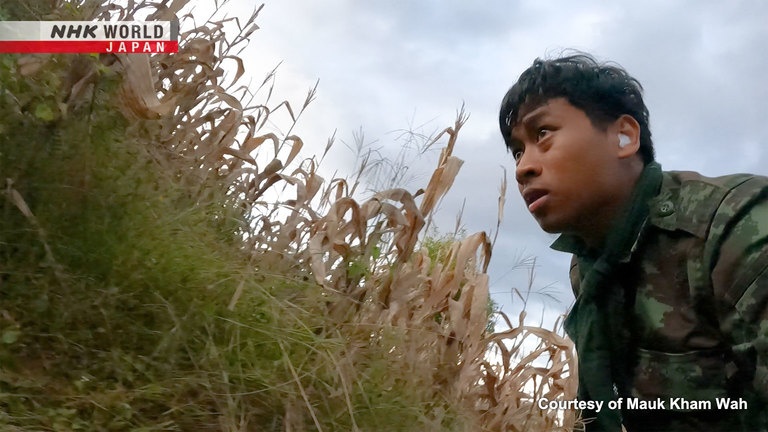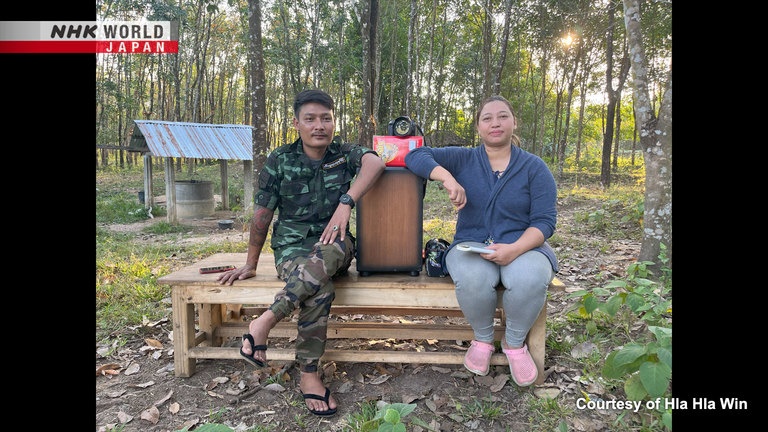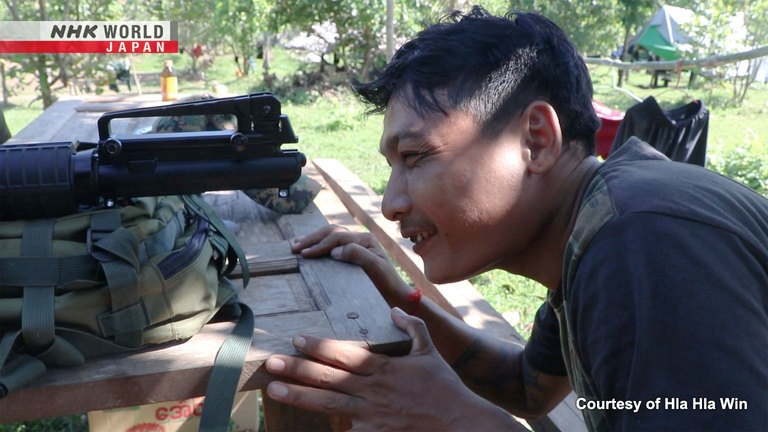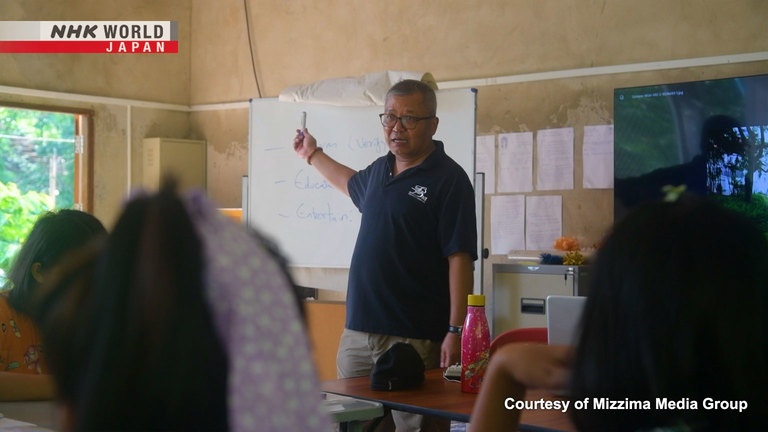Two and a half years since Myanmar's coup d'état, its military maintains control of the government. Armed groups continue their long struggle for democracy, and amid tightening restrictions on journalism, some reporters are joining the front lines. Their cameras capture intense fighting that draws civilians into the struggle, and volunteer soldiers who continue to fight despite a lack of guns and ammunition. One independent media group has launched a top-secret project to develop information sources within Myanmar's borders. Meet the journalists risking their lives to report from the front lines, and the civilian volunteers battling to regain their stolen democracy.




Transcript
Footage taken by a young filmmaker on the frontlines of Myanmar's civil war.
They hit the same spot.
Two and a half years have passed since the country's military coup d'etat in 2021.
Myanmar's military holds control over the government,
while the opposing People's Defense Force continues the fight for democracy.
Most of the group's soldiers are ordinary civilians with no military experience.
Hurry, hurry!
They're right behind us!
He's already gone.
That shell sounded close.
A female journalist records a village under fire from the military.
It's Christmas, and they are
still bombarding us.
A mired stalemate that's entangled women and children.
Some on the front lines have taken up cameras.
They hope to show the world their battle for freedom and democracy,
and what it means to live amid the terror of war.
The footage reveals the unfiltered characters of young soldiers in the moments between battle.
Lots of people, especially young people, like 18 years, 19 years, 20 years.
Lots of young stars who were about to do something big in their life, in their personal life.
They stopped their personal life, and they joined the armed struggle.
It's not that they like the guns.
These journalists are braving danger to record what's happening in their country.
We join the front lines of Myanmar's civil war, through the lenses of reporters on the ground.
Mae Sot is a city in the northwest of Thailand, close to the Myanmar border.
Long a hub for transport and trade, it's also home to many Burmese nationals.
Over 100,000 refugees are reported to have fled Myanmar since the military coup.
One filmmaker is keeping a low profile in the city's outskirts.
28-year-old Mauk Kham Wah agreed to appear on camera,
on the understanding that the location of his home would remain secret.
For the last year, he's taken refuge in this city along with his compatriots.
And that's me. See?
- Is this you?
- Yeah, that's me.
A decade ago, Mauk Kham Wah was a student and democratic activist.
It was during Myanmar's transition from military rule.
Mauk Kham Wah organized pro-democracy student protests, and was imprisoned as a political offender.
He later became interested in photography and film.
He took it up as a career, and was hard at work on his debut project.
But in February 2021, Myanmar underwent its sudden military coup.
Mauk Kham Wah took part in protests in Yangon,
but faced severe crackdowns at the hands of security forces.
He opted to return to his home in Kayah State, in Myanmar's east.
For the next year, he recorded the lives of his local PDF soldiers.
I never have opinions and thoughts about going to the war zone and taking war pictures.
This is really unexpected.
The pro-democracy forces of the PDF exist all over the country.
The group is estimated to have around 70,000 young members.
They're fighting the army under the auspices of Myanmar's democratic government in exile, the National Unity Government.
We're spotted.
Move there.
It's safer.
Two months after joining the unit, Mauk Kham Wah is facing his first major combat.
You're visible, hide!
A battle across hilly terrain continues back-and-forth for seven days.
Actually you know, I thought at first, you know,
I thought that battle was like - like, the movies, you know?
Too many people shooting each other, you know?
It's like, Hollywood, you know? Explosions!
But in the reality not like that.
Everyone's hiding from everyone.
So you cannot see much of the people, you know?
I'm holding camera instead of guns because I'm - I'm not the fighters.
I have to capture, I have to archive the moment so that the next generation of people,
or the other people from outside of Myanmar.
So they can, they all can see that what's happening in our state.
After the coup, Mae Sot became home to many journalists escaping military oppression.
Hla Hla Win often crosses the border into Myanmar to report on the war.
This photo is the first time I -
I went to the Mae Sot, the training, the journalist training.
- When was that?
- It was a long time ago.
Two thousand... 2008.
Hla Hla Win was a reporter for independent media outlet, the Democratic Voice of Burma.
Exiled from Myanmar, the DVB encouraged democratization from outside its borders.
She was arrested for reporting on democratic protests and given a 27-year sentence.
She'd been imprisoned for two and a half years,
until the transition to civilian rule saw her released under an amnesty.
Pull me up.
October 2021.
For the first time since the coup, Hla Hla Win begins her reporting across the border.
This river marks the border.
I've crossed the river
and I'm back in Myanmar to report.
This region is not 100%
safe or secure.
But there are things I have to record.
That's why I've returned.
The situation has deteriorated to the point that she can no longer use a bus or bike to travel.
The journey takes four days.
Hla Hla Win is visiting Thu Zaw, a PDF squad commander in a village in Kayin State, in Myanmar's southeast.
He heads 80 young volunteers and is preparing them for combat at a base here.
Come here.
There's a weeklong training
on IEDs. Interested?
- Yes, sir.
- Sign up.
Thu Zaw used to run a small second-hand clothing store in Yangon.
He's an old friend of Hla Hla Win's.
His rage at the military coup provoked him to enlist with the PDF.
I have two kids.
My wife was pregnant
when I left for jungle training.
So I've got three boys now.
I have to win this fight.
To meet my new son.
Today, Hla Hla Win is accompanying Thu Zaw to the camp of
an ethnic minority force which fights alongside the PDF.
Thu Zaw's goal is to learn how to use the guns he's recently acquired.
Adjust it here.
Take a look.
You see?
Thu Zaw's unit are all civilians.
Nobody has any formal military experience.
They have just two guns between 80 soldiers.
Don't film this!
Thu Zaw has returned to the camp to find a donation of clothes.
Despite his status as squad commander, he must arrange for all his soldiers' weapons and clothing.
At first, food shortages
made things tough.
We didn't know where
to go for training.
We still have so many youngsters
waiting for training.
Thu Zaw's wife and children are still in Yangon.
The oldest isn't back yet.
The baby's asleep.
- How many days now?
- Seven.
Too early for diapers.
Show me his face.
His youngest son, who still hadn't been born when he joined the PDF.
Thu Zaw has yet to meet him.
"I want to go home."
"It was sleeting when I left."
"It was such a difficult road."
"I took it one step at a time."
"The homesickness simmers
quietly inside me."
This series of photographs is titled "Uprising in Myanmar."
It captures Myanmar in the immediate aftermath of the military coup.
It received an Honourable Mention at the 2022 World Press Photo contest.
It's the work of a photographer who goes by the alias Ta Mwe.
He's currently taking refuge in Thailand.
He cannot reveal his name or face due to safety concerns.
A former commercial photographer, he especially enjoys working with film.
I was like, angry because the country is like a-
we believed that the country is on the right path to become a fully developing country.
But this is a military - it was turning our country back into the old days.
The military coup of February 2021 crushed Myanmar's nascent democracy.
Ta Mwe turned his camera towards the many citizens demanding
that the military release ousted democratic leader Aung San Suu Kyi from detention.
Security forces fired on protestors, suppressing them violently.
Many citizens were killed.
Ta Mwe and other journalists found their work increasingly difficult.
There is also like a - oppressing on the journalists and also like -
there are many journalists in prison in Myanmar already.
So there are only a few journalists left and they are also -
they had to run away from the military authorities.
That's why it is like - most of the news are under-reported.
Ta Mwe is investigating a concerning incident.
I - when I was there, I couldn't go to this forest area
because there might be some landmines planted.
He filmed this in December 2022 near the village of Moso, in Kayah State.
Burned cars, left in the open.
On Christmas Eve of the previous year, dozens of local residents, including children, were murdered here.
Ta Mwe wanted to record evidence of the Moso Massacre, which allegedly involved the army.
He gathered material by talking to local resistance fighters and villagers.
I heard there was a commotion
between 9 and 10PM on the 24th.
I wondered what it was.
In the morning, I got a report.
Something had been burned.
This was filmed by a soldier with the ethnic minority force, immediately after the incident.
Look at this inhumane action
by the military.
I can count over 30 people.
Burned by the flames.
Look at their remains.
This is brutal.
Democratic forces wielded these witness statements to censure the military for its crimes.
But the military maintains that it was the result of a combat operation.
Ta Mwe managed to find a doctor who performed autopsies on the victims.
They were tied up, forced to
kneel, then set alight and killed.
Some were burned after they
were dead, others were burned alive.
I knew some had been burned alive.
Because those bodies had
traces of smoke in their lungs.
Ta Mwe also spoke to survivors who'd fled to different regions.
This woman lost her husband and is now raising their four children alone.
I lost my husband and three relatives.
They were killed in the massacre.
I hid this from the children.
But people told them. 'Your dad
was burned alive by the army.'
They asked me if it was true.
I was so upset I burst into tears.
My son cried so hard.
The exiled government is preparing to take Myanmar's military
to the International Criminal Court for the Moso Massacre and other actions against civilians.
They plan to use the statements recorded by Ta Mwe.
The military will commit more war crimes if nobody is stopping them.
That's why we need these kinds of stories out to the international community so they can know what is happening,
and they can stop these kinds of tragic events from happening to the civilians.
As the military cracks down even harder on journalism,
one independent media group is training young reporters.
News organization Mizzima had its media license revoked soon after the coup.
Today, it operates from Thailand and India, sharing news through social media
and video streaming platforms to some 23 million followers.
Welcome to our Mizzima viewers.
This is Mizzima TV News Hour.
Toe Zaw Latt is a senior editor based in Thailand.
Like Hla Hla Win, he's a former reporter for exiled media group DVB.
We still have an office in Yangon too.
Undercover office.
That's why we call it one foot in and one foot out production.
It's a good thing I have experience, you know, because I was exiled; we've been doing this for a long time.
Toe Zaw Latt is a member of a group that originated in the late 80s to call for democracy,
now known as '88 Generation.'
At one point, he was involved in armed conflict.
After living in exile in Thailand and Australia, he joined the DVB in the mid-2000s.
As Myanmar began its transition to civilian rule in 2011,
he reported on democracy in his home country as the chief of the DVB's Yangon bureau.
He remained on-site after the coup to continue reporting.
But military oppression became so overwhelming he had to leave again.
He then joined Mizzima, a media group run by one of his old student colleagues.
We'd become one of the world's most journalists in jail, journalists killed.
So we have a long way to go back.
So we have very short honeymoon period for the media and the press freedom.
Burmese people need information to do their decision making. So that's why continue to do this.
Mizzima has a top-secret project that's been unfolding within Myanmar's borders since September 2022.
This is Thailand.
The other side is Myanmar.
That's Kayin State.
Toe Zaw Latt drives a group of colleagues to their destination.
The long civil war saw many battles.
The roads are a mess.
He arrives at night at a facility deep in the mountains.
Most locals don't even know of its existence.
It's here that the top-secret project is taking place.
A media institute to train journalists.
When reporting, you must
always verify your facts.
Where did the information come from?
Always remain skeptical.
Even if it comes from parents
or friends, never just accept it.
Always verify your facts.
15 young journalist hopefuls from all over Myanmar are taking part.
They will spend two months here studying mobile journalism techniques
that make use of smartphones, including filming and editing.
This young journalist is from Rakhine State in Myanmar's west.
Human rights violations are common
in my home region.
People need to know this.
I know there's danger, but I have
to tell people what's happening.
I'll do my best as a reporter.
Over half our trainees are still out there
working as journalists.
Young folks today are focused and
energetic, despite terrible situations.
We want to train professional reporters
who can help change Myanmar.
That's the goal of this training.
Mauk Kham Wah has been embedded with his group for four months.
Find a car.
Lower him slowly.
Let's rest here.
It hurts so much.
It's okay, you're okay.
Is it a shell fragment?
Combat with the far greater forces of the military has intensified.
They hold a funeral for one of Mauk Kham Wah's comrades.
His name is 'Long Hair.'
Same PDF with me.
And we were going to the front line a lot, you know?
And he's very funny, and he's very smart.
Yaung Gyi Bwe, or 'Long Hair.'
A lover of books, he would often read between battles, and was a well-liked member of the unit.
In the military tank, there is a .5 machine gun on the top of the tank.
And the tank - the .5 shoot them.
And he got shot and he died on the field.
And yeah. Everyone's crying on that day too because he was a beloved guy.
The PDF recognizes you as
a hero of the people.
Today, you are formally
released from the PDF.
Permission to head out to
wherever you want to go.
Lots of soldiers are, you know, were falling every day, you know.
So I feel that, I feel that they didn't have a chance to carry on their normal -
lead a peaceful life anymore.
That's not fair, you know?
Some people are having party,
in some place people are going to EDM festival, some people are traveling.
Some people are doing what they love.
Some people are hanging out with their girlfriend or boyfriend.
But. Some of my friends are dying.
A few weeks later.
Mauk Kham Wah faces what he calls the worst experience of his life.
The army's fleeing!
The military holds the strategic city of Moe Bye.
His PDF unit has orders to attack.
Fall back, fall back!
But the army sends out its tanks, and the unit is struggling.
They're on the attack!
Do we have AK rounds?
We're out.
We've got M16 rounds.
Another unit is fighting up ahead.
Come in, respond!
They're in the right trench.
We'll fire on them from here.
When is backup arriving?
We need support now!
The situation develops rapidly.
We have wounded, move!
Hang in there, the base is close.
You're with comrades.
The group in front is almost entirely wiped out by concentrated attacks from the army.
I saw him get shot.
Stay calm.
This road is safe, take it slow.
My friend's been shot.
17 soldiers, dead in mere moments.
Stop watching and help!
Mauk Kham Wah's group is forced to retreat.
He continues to document the chaos.
After a few minutes of this, he died.
His best friend is here.
They can't even carry their friend's body because it's very heartbreaking for them.
This photograph was chosen to represent South-East Asia and Oceania for the 2023 World Press Photo contest.
It shows that we are really, really struggling to fight back this monster military junta.
I want to show the reality of our people's struggle.
I want them to know that there is a country where a group of people
are fighting back the evil people for the sake of freedom, for the sake of democracy.
Mauk Kham Wah also captures the soldiers during lighter moments.
Myanmar's traditional water festival.
The unit interrupts training to have a bit of fun.
A brief moment that feels a world away from the harsh realities of combat.
December 2022.
It's December 26 today.
I'm very close to the front line here.
I can't hear any gunfire,
but who knows what's coming.
Hla Hla Win has returned to the front lines.
She's filming PDF squad leader Thu Zaw for the first time in nearly a year.
That shell sounded close.
The village where the unit is stationed is close to the front lines.
The military often fires on it, endangering the villagers.
I've been here for six days.
As you see, we're hiding
from aerial shelling.
We just heard two loud
explosions very nearby.
I'm with a female civilian fighter.
And a mother with her two-month-old.
The next day, she films the village.
- Do all the houses have shelters?
- Oh yes.
We can no longer outrun the shelling
so we just stay in the shelters.
Here's our shelter.
How many does it hold?
About ten people.
The military has stepped up attacks from fighter planes and helicopters.
They're flying low.
With no anti-aircraft guns, Thu Zaw's unit cannot fight back.
Supplies from the exiled democratic NUG are still scarce, and the unit is low on weapons and ammo.
I keep saying the most important
thing right now is weapons.
We have to get our hands on
enough weapons to beat them.
A month later, Thu Zaw has come to Mae Sot, a border town in Thailand.
Naturally, Hla Hla Win is with him.
Thu Zaw is visiting Kyaw Ni, an old acquaintance who currently serves as the Deputy Labor Minister of the NUG.
He's here for a face-to-face discussion on the shortage of weapons and funds.
We've had to procure our own ammo
for the last few engagements.
Who should I go to for our supplies?
I want to send my men out with
enough weapons to keep them safe.
We have barely half the ammo we need.
There must be something you can do.
This entire movement is
driven by civilians.
We have hundreds of thousands
fighting for the cause.
We can't give everyone everything.
We need support from the international community.
Maybe then we could outfit everyone better.
After his meeting, Thu Zaw heads to a house in town.
Donations from civilians are used here to make ready-to-eat mobile meals for troops on the front lines.
The meals are made from dried chicken and rice, and other ingredients.
My unit has a donation of US $150.
That will give us 360 meals.
Why do we only get 360 when
this unit gets a thousand?
Don't complain!
Someone wanted to donate to another unit.
I can't do anything about that.
After two years heading his unit, Thu Zaw still doesn't know when he'll get to see his family again.
- Is that your son?
- Yes.
I'm not the only one far away
from family and friends.
We're all in the same boat.
We have to help each other.
When I think of my family...
We just have to support one another.
The Mizzima Media Group has been running its top-secret journalism school for around a year.
How are you?
News is coming in from the newly trained journalists spread across Myanmar.
I saw the article you wanted to write.
You investigated it on the way
home from training.
That's right.
The army was extorting money from
people at over 20 checkpoints.
It was anonymous,
but I knew it was you.
Safer not to put my name to it.
You stay in touch with other students?
Yeah, I do.
Good. Remember, safety first!
Hopefully these are the new generation of journalists who are going to play an important role in the future of Burma.
It's very small scale, I have to say. That's all we can afford at the moment.
Mauk Kham Wah has concluded his embedment on the front lines.
He publishes his photographs and footage, while exploring ways to return to his unit.
Once this will be finished, what do you want to do?
- Everything settled, everything peace.
- You mean after the revolution, yeah?
- Uh, yeah.
- I would redo the movie projects that I haven't done yet.
I will go to US, I'll go to Japan, I'll do movies,
I'll use the international crew in order to get the best movies.
Hla Hla Win continues to report on Thu Zaw.
He says the PDF is putting together plans to attack Yangon and other cities.
Our country is going to face
even worse times.
I want to make new stories
to help us recover.
Ones that will inspire people.
The civilian struggle to win back democracy, with no end in sight.
These journalists continue to risk everything to report the situation on the ground.